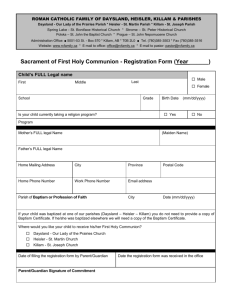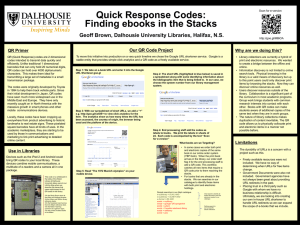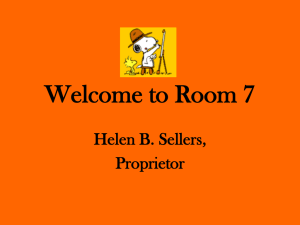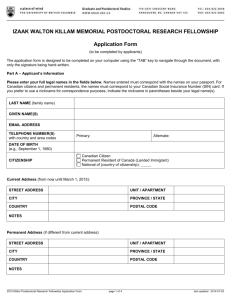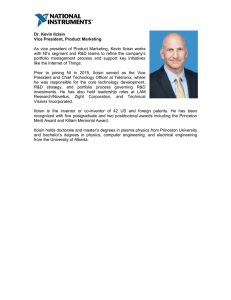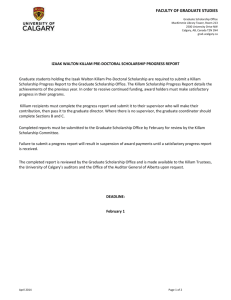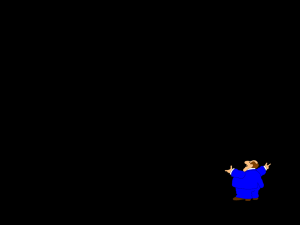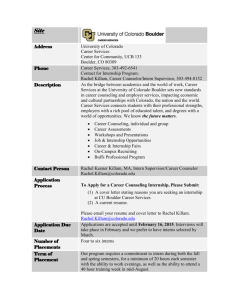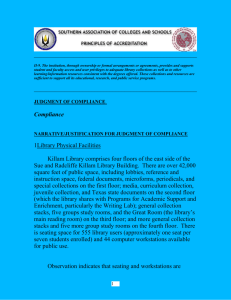KILLAM PROGRAM Building Canada’s Future Through Research 1
advertisement
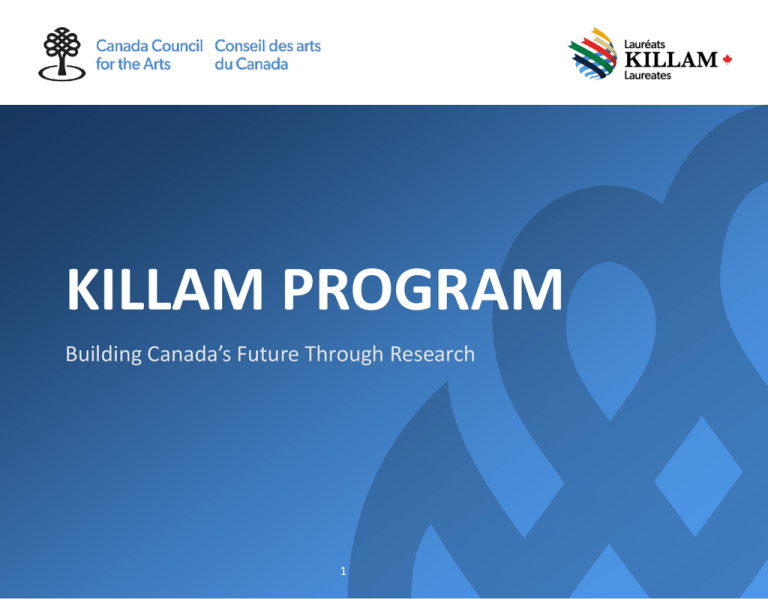
KILLAM PROGRAM Building Canada’s Future Through Research 1 Izaak Walton Killam Dorothy J. Killam 2 “My purpose in establishing the Killam Trusts is to help in the building of Canada’s future by encouraging advanced study. Thereby I hope, in some measure, to increase the scientific and scholastic attainments of Canadians, to develop and expand the work of Canadian universities and to promote sympathetic understanding between Canadians and the peoples of other countries.” From the Will of Dorothy J. Killam The Killam Trusts are valued at about $400 million 3 Institutions with a Killam Endowment Canada Council for the Arts Dalhousie University The Montreal Neurological Institute at McGill The University of Alberta The University of Calgary The University of British Columbia 4 Canada Council Killam Program funded by the revenues from an endowment of $57 million (at 31 March, 2014) funds donated by Dorothy J. Killam in memory of her husband, Izaak Walton Killam Killam Research Fellowships (KRF) Killam Prizes 5 KILLAM RESEARCH FELLOWSHIPS 6 Killam Research Fellowships (KRF) awarded for projects in humanities, social sciences, natural sciences, health sciences or engineering, and for interdisciplinary projects adjudicated by an expert 15-member multidisciplinary selection committee of senior researchers from Canadian universities 7 Killam Research Fellowships (KRF) Designed for established career scholars in Canadian universities, primarily, who: have demonstrated outstanding research ability have published research through substantial publications in their field over an extended period are Canadian citizens or permanent residents 8 Killam Research Fellowships (KRF) worth $70,000 per year – a release-time award KRF must be for two years, with an interim report required at the end of the first year to support a specific research project most recipients are full professors in Canadian universities 9 “release-time” fellowships (full release from teaching and administrative work for two years) applicants must describe administrative and teaching load for current year, last year and next year (expected) • name and number of courses • number of class hours per course • graduate/undergraduate level • number of students per course • supervision 10 most projects received are individual ones for a team or multidisciplinary project, the applicant’s role must be the principal one and clearly defined 11 Evaluation criteria The project The applicant 12 The project scholarly significance creativity and originality, potential contribution to the advancement of knowledge appropriateness and clarity of the theoretical approach, formulation of hypotheses and statement of problems 13 The project cont’d appropriateness of research plans and methods with respect to the objectives of the project appropriateness of the proposed schedule of research; accessibility of required data where applicable, social relevance or practical importance of the project 14 The applicant qualifications, track record and scholarly achievements experience in areas related to the proposal 15 The KRF application process all applications must be submitted via the Killam internet application site and the Common CV site deadline: 15 May, 2015 for electronic application; supporting documents with an original signature must be postmarked by the deadline. NOTE: If this date falls on a weekend or statutory holiday, the deadline moves to the next business day. No faxes or e-mailed documents will be accepted user names and passwords for the Killam site will be available: killam@canadacouncil.ca you can request info at any time you can go to the Common CV site any time and begin to enter your generic information 16 Specified information is entered into the Killam internet application site and into the Common CV site www.ccv-cvc.ca 17 Common CV all KRF applicants must go to the Common CV site and fill in all required elements (i.e. personal information, education, recognitions, user profile, employment, affiliations, leaves of absence, research funding history) the information will be transferred electronically to the Killam Program by the Common CV 18 For the Killam site, attached documents in Word or PDF (PDF is preferred for accuracy of conversion and transmittal) 1. Project summary (up to one page - in a black font size of 11 points or larger, with ¾ inch margins) 2. Project description (up to six pages - in a black font size of 11 points or larger, with ¾ inch margins) 3. Five most significant contributions (one page total for all five) and publications (from the start of your career; include books, book chapters, refereed publications and refereed conference proceedings only) 19 Please note the project summary should be understandable by a highly educated non-specialist the project description should be directed to the specialist scholar, but aim to be understandable to the non-specialist 20 Expert assessments applicants provide names of four expert referees (be careful to avoid conflicts as indicated in the instructions to applicants) Council reserves the right to seek additional Canadian and international assessors all assessments are to be based on the evaluation criteria For second-time applications, different referees are to be listed 21 Documents to be sent by mail Must be postmarked by May 15, 2015 from wherever you are in the world 1. the letter you print from the Killam site at the end of the application process, with your original signature 2. proof of citizenship or permanent resident status 3. copies (40) of colour pages or photos (to ensure fidelity of reproduction), if any, which are in your detailed project description 22 Tips and points to note your university research office must review, approve and submit your application using the Killam internet application site your university may require specific signatures before it will submit check with your research office regarding its own internal deadline (normally at least two weeks before KRF deadline of 15 May) and other requirements 23 Other research support funds for research expenses must be obtained elsewhere important to show current support for this and other projects from SSHRC, NSERC, CIHR, etc. (part of Common CV info) selection committee needs to know you have the wherewithal to carry out the project. 24 Scholarly awards part of Common CV info information assists in determining your stature within the research community honourary society memberships in Canada and abroad 25 Special conditions for Fellows also holding a Canada Research Chair (CRC) the university must confirm that the Fellow has teaching responsibilities from which to be released the Killam Program makes a $70,000 contribution towards defraying replacement costs CRC pays other research expenses 26 Canadians and permanent residents Canadians may use KRF wherever the research is carried out permanent residents, must use KRF primarily in Canada (brief trips outside Canada are ok) University must confirm permanent residents have an ongoing position at the university 27 Adjudication process first round in late September: sub-committees choose finalists second round in January: full committee chooses recipients 28 Notification of results results are announced to recipients by mid-February public announcement in March/April must begin Fellowship by 1 January, following notification, at the latest 29 The following documents must be received at Canada Council for the Arts before payment is released: 1. interim and final reports from the Fellow 2. university statement confirming that the Fellow was released from teaching and administrative duties and that the university continued to pay the Fellow’s full salary and benefits 30 KILLAM PRIZES 31 Killam Prizes five prizes awarded annually - $100,000 each health sciences, natural sciences, engineering, humanities, social sciences for distinguished career contributions to one of these fields must be nominated; may not apply for the prizes Killam Selection Committee also selects winners of Killam Prizes nominee must be a Canadian citizen 32 The nominator must provide the following completed, signed nomination form signed letter of nomination (one nominator) a brief description of the significant contributions to the nominee’s research discipline a complete cv including a list of publications one-page biography (education, career path, research achievements, honours/awards) field in which the nomination is made Canada Council reserves the right to change this in order to ensure similar candidates are in the same group 33 The nominator must provide the following cont’d list of up to three experts, in Canada or abroad, who will be providing letters of support (which are to be included within the nomination package) - only letters of support from the three experts listed in the nomination form will be accepted the Canada Council reserves the right to request letters of assessment from external evaluators confirmation of Canadian citizenship (e.g. photocopy of main passport page) all nomination documents, including original signed letters of support must be postmarked no later than 15 June, 2015 34 Notification of results Prize recipients are notified by telephone by midFebruary nominators will be notified of the results, in writing, in March news release in early April 35 Other major prizes and awards at the Canada Council for the Arts 36 in addition to its principal role of promoting and fostering the arts, the Canada Council for the Arts administers and awards many prizes and fellowships in the arts, humanities, social sciences, natural and health sciences, engineering, and arts management these prizes and fellowships recognize the achievements of outstanding Canadian artists, scholars, and administrators the Canada Council is committed to raising public awareness and celebrating these exceptional people and organizations on both a national and international level Please visit our website at http://canadacouncil.ca/council/prizes for a complete listing of these awards 37 John G. Diefenbaker Award to allow a distinguished German scholar to come to a Canadian university for up to one year to pursue a research project and contribute to the intellectual life of Canada funded by a $1M endowment from the Government of Canada humanities and social sciences only host Canadian university nominates the scholar value of the award - up to $95,000 38 Molson Prizes two prizes of $50,000 each are awarded annually to distinguished Canadians, one in the arts and the other in the social sciences and humanities funded from the income of a $1M endowment given to the Canada Council by the Molson Family Foundation the Molson Prizes encourage Canadians honoured with this distinction to continue contributing to the cultural and intellectual heritage of Canada the Canada Council administers the awards in collaboration with the Social Sciences and Humanities Research Council (SSHRC) 39 QUESTIONS? Luiza Pereira, Program Officer, Prizes Section E-mail: luiza.pereira@canadacouncil.ca Phone: 1.800.263.5588 ext. 4086 --------------Financial and Program Assistant, Killam Program E-mail: killam@canadacouncil.ca Phone: 1.800.263.5588 ext. 4083 40
